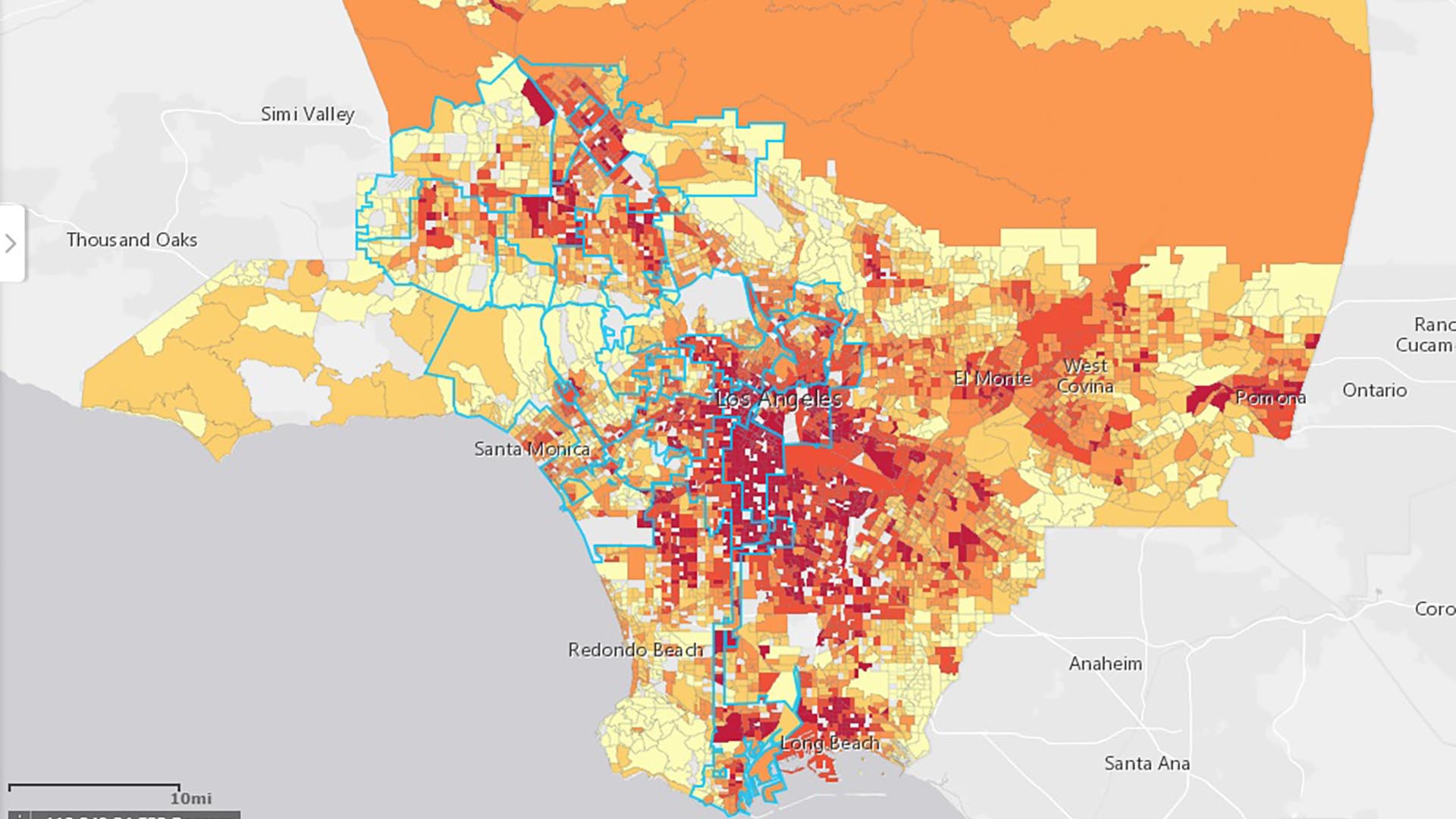LABarometer
Overview

LABarometer is a research center housed at the USC Dornsife Center for Economic and Social Research (CESR). We conduct basic and applied social science research on issues affecting Los Angeles County residents, with the aim of informing academic research, public discourse, and policy. At the heart of our research is the LABarometer Panel, a probability-based Internet survey panel of approximately 2,000 adults randomly selected from households throughout Los Angeles County. The LABarometer Panel is a sub-panel of the Understanding America Study.
LABarometer has three longitudinal data collection efforts:
LABarometer core surveys are fielded to the LABarometer Panel on a biannual basis to monitor social and economic conditions in Los Angeles County. These longitudinal surveys focus on four dimensions of individual and community well-being: livability, affordability, mobility, and sustainability. LABarometer surveys include questions about residents’ lives, their attitudes and behaviors, and the challenges they encounter in their communities, filling data gaps on topics ranging from housing insecurity and climate resilience to transportation behavior and the economy.
COVID-19 tracking surveys were fielded from March 10, 2020, to July 20, 2021, to the LABarometer panel as part of a national survey effort called Understanding Coronavirus in America. This longitudinal survey was launched in March 2020 to track the impact of the COVID-19 pandemic on U.S. residents. Surveys cover a number of topics related to COVID-19, including health-related attitudes, preventive health behavior, mental and physical health, employment, discrimination, family, and education.
Wildfire tracking surveys have been fielded since February 1, 2025, to evaluate the impact of the January 2025 Los Angeles County wildfires on residents and to understand residents’ protective strategies, risk perceptions, and policy preferences in the aftermath. Wildfire-related data were collected initially through a standalone survey and subsequently through dedicated wildfire modules embedded in the LABarometer core surveys.
The Panel

-
The LABarometer Panel is an Internet panel of approximately 2,000 adults living in households throughout Los Angeles County. It is a sub-panel of the Understanding America Study (UAS), a national Internet panel of 14,000 U.S. residents maintained by the USC Dornsife Center for Economic and Social Research.
LABarometer sampling and recruitment procedures are handled by the UAS team. These procedures were designed to minimize bias and ensure LABarometer accurately represents the L.A. County population.
For more information about the LABarometer Panel, including up-to-date demographic information, recruitment and retainment procedures, standard variables, and survey weights, please see our LABarometer Panel Information sheet.
-
LABarometer sampling and recruitment procedures are handled by the UAS team. These procedures were designed to minimize bias and ensure LABarometer accurately represents the L.A. County population.
To select households for our panel, we use an address-based probability sampling approach. This means households are randomly selected from a comprehensive list of L.A. County mailing addresses provided by the U.S. Postal Service. Any adult aged 18 and older living in a contacted household is eligible to participate in our panel.
To recruit selected households into our panel, we follow a multi-step recruitment protocol that includes a pre-notification postcard, multi-modal recruitment strategy, Internet tablets, monetary incentives, and follow-ups. This protocol was designed to maximize participation and is based on established best practices. More detailed information about UAS recruitment procedures can be found here.
All surveys fielded to the LABarometer Panel are programmed by the UAS and hosted on the UAS website. Following UAS protocols, surveys distributed to the panel are in both English and Spanish and are mobile-friendly. Average response rates for individual surveys are 70-80%.
To participate in a survey, panel members can use any computer, cell phone, or tablet with Internet access. The majority of panel members have their own internet access, but internet access is not a barrier to panel entry. Panel members who do not have access to internet are provided with an internet-enabled tablet to ensure their regular participation in our surveys.
Core Surveys

-
LABarometer surveys are fielded to the LABarometer Panel on a biannual basis to monitor social and economic conditions in Los Angeles County.
From 2019 to 2022, LABarometer survey waves comprised four surveys, fielded three to six months apart. The surveys covered the following topics: Livability, Mobility, Sustainability & Resilience, and Affordability & Prosperity. In 2022, LABarometer moved to a biannual survey frequency and these four surveys were combined and reduced in size to the following two surveys.
The LABarometer survey on Livability & Affordability tracks neighborhood livability and affordability stress in Los Angeles County, guided by the principle that a livable neighborhood is in one in which residents feel happy, healthy, safe, socially connected, and have access to affordable goods, services, and amenities. The survey covers the following topics: life satisfaction, stress, housing quality and plans, neighborhood satisfaction, crime and safety, social engagement, as well as the accessibility and affordability of four key resources in L.A. County – housing, healthcare, food, and education. The survey also includes LABarometer’s consumer sentiment index, a set of six questions designed to monitor individual finances and the economy.
-
Links to our survey data and documentation are included below. For a cleaned and harmonized longitudinal file of all of our completed surveys, see Longitudinal Data. For individual survey datasets, see Individual Survey Data.
UAS registration is required to download any LABarometer dataset. To become a registered user, please visit the UAS registration page and create an account.
-
The LABarometer Longitudinal File is a cleaned and harmonized dataset containing all waves of LABarometer Survey data. Variable names have been harmonized, allowing easy longitudinal analysis. For the vast majority of cross-sectional and longitudinal analyses, this longitudinal file will be the dataset of choice.
Follow the “Data” link below and you will be taken to a page on the UAS site where you can download the LABarometer Longitudinal File (available in Stata and CSV file formats). Click on the codebook link to download the longitudinal file codebook directly.
LABarometer Longitudinal File – Data
LABarometer Longitudinal File – Codebook (direct download)
-
For individual survey datasets, you can follow the Data & Codebook links below to view the codebook and metadata and to download individual survey datasets. You can also visit LABarometer’s data page on the UAS website for direct data download links.
Note that each LABarometer survey has a UAS survey number as LABarometer is a sub-panel of the Understanding America Study.
WAVE 1
- Livability Survey (July 19, 2019 – September 30, 2019) – UAS 194 – Data & Codebook
- Livability Survey National Supplement (August 12, 2019 – September 08, 2019) – UAS 199 – Data & Codebook
- See satisfaction, neighborhood, and financial sections
- Mobility Survey (December 11, 2019 – February 7, 2020) – UAS 219 – Data & Codebook
- Sustainability Survey (June 03, 2020 – July 13, 2020) – UAS 286 – Data & Codebook
- Affordability Survey (September 30, 2020 – November 1, 2020) – UAS 312 – Data & Codebook
WAVE 2
- Livability Survey (November 9, 2020 – January 7, 2021) – UAS 320 – Data & Codebook
- Mobility Survey (March 2, 2021 – April 30, 2021) – UAS 379 – Data & Codebook
- Sustainability Survey (October 14, 2021 – January 9, 2021) – UAS 363 – Data & Codebook
- Affordability Survey (July 19, 2021 – September 5, 2021) – UAS 403 – Data & Codebook
WAVE 3
- Livability & Affordability Survey (June 6, 2022 – September 4, 2022) – UAS 468 – Data & Codebook
- Mobility & Sustainability Survey (January 27, 2023 – March 31, 2023) – UAS 510 – Data & Codebook
WAVE 4
- Livability & Affordability Survey (July 13, 2023 – September 30, 2023) – UAS 566 – Data & Codebook
- Mobility & Sustainability Survey (February 21, 2024 – April 21, 2024) – UAS 595 – Data & Codebook
WAVE 5
- Livability & Affordability Survey (July 24, 2024 – October 15, 2024) – UAS 637 – Data & Codebook
- Mobility & Sustainability Survey (February 19, 2025 – April 27, 2025) – UAS 680 – Data & Codebook
WAVE 6
- Livability & Affordability Survey (August 28, 2024 – November 14, 2024) – UAS 739 – Data & Codebook
Covid-19 Survey

-
COVID-19 tracking surveys were fielded to the LABarometer Panel as part of a national survey effort by the UAS, called Understanding Coronavirus in America (UCA). UCA surveys cover a number of topics related to COVID-19, including attitudes and preventive behaviors, mental and physical health, employment, discrimination, family life, and education.
Understanding Coronavirus in America launched as a stand-alone survey (wave 1) on March 10, 2020, and a tracking survey (waves 2-29) on April 1, 2020. Tracking survey waves 2-24 were administered to consenting members of the Understanding America Study panel (including the LABarometer sub-panel) on a bi-weekly basis from April 1 2020 through February 16 2021. Waves 25-29 of the tracking survey were administered on a monthly basis from February 17-July 20, 2021. Subsequent survey waves (30-33) have been administered on a quarterly basis as stand-alone surveys, similar to Wave 1.
At the request of the Los Angeles County Department of Public Health, a short supplement was added to tracking survey waves 2-29 to increase the frequency of survey data collection in Los Angeles County – from bi-weekly to weekly in waves 2-24 and from monthly to bi-weekly in waves 25-29.
-
For a more detailed description of the content and design of the UCA data collection effort in Los Angeles County, and to access the data, visit the UAS’s COVID Los Angeles data page.
For a more detailed description of the content and design of the UCA data collection effort at the national level, and to access the data, visit the UAS’s COVID National data page.
Wildfire Survey
-
The January 2025 Los Angeles wildfire were among the largest wildfires in Los Angeles history, burning over 37,000 acres and 16,000 structures and causing over $50 billion in damage. This survey was designed to evaluate the immediate impact of the January wildfires on residents and to understand residents’ protective strategies, risk perceptions, and policy preferences in the aftermath.
The LABarometer Wildfire Survey (UAS 691) was fielded from February 1 – March 30, 2025 and a total of 1,360 Los Angeles County residents participated, resulting in a participation rate of 72%. The survey covers the following topics: physical and mental health, housing hardships, work hardships, financial impacts, food insecurity, social support, community resilience, disaster preparedness, protective behavior, risk perceptions, and policy attitudes.
Follow-up survey modules were incorporated into LABarometer’s existing core surveys, which are fielded biannually.
-
Wildfire-related data were collected initially through our standalone Wildfire Survey (UAS 691) and subsequently through dedicated wildfire modules embedded in the LABarometer core surveys.
Below are links to each wave of wildfire-related data:
- Wave 1 (February 1 – March 30, 2025) – Wildfire Survey (UAS 691) – Data & Codebook
- Wave 2 (August 28 – November 14, 2025) – Livability & Affordability Survey (UAS 739) – Data & Codebook
- Wave 3 (TBD) – Mobility & Sustainability Survey
Contextual Data

The UAS Exposome Database is a collection of user-friendly datasets that enable researchers to study the impact of physical, social, and policy environments on UAS respondents, including LABarometer survey participants. UAS data users with access to the UAS enclave can request linkage of selected variables of these datasets to individual respondents. To learn more about the data, click here. For guidance on how to access this data, click here.
Team
Kyla Thomas

Arie Kapteyn
Executive Director of CESR

Tania Gutsche

Evan Sandlin

Michele Warnock

Nick Aldrich
Research Assistant

Publications
-
WAVE 1
LIVABILITY MOBILITY SUSTAINABILITY AFFORDABILITY WAVE 2
LIVABILITY MOBILITY SUSTAINABILITY AFFORDABILITY WAVE 3
LIVABILITY & AFFORDABILITY MOBILITY & SUSTAINABILITY WAVE 4
LIVABILITY & AFFORDABILITY MOBILITY & SUSTAINABILITY WAVE 5
LIVABILITY & AFFORDABILITY MOBILITY & SUSTAINABILITY SUPPLEMENTAL REPORTS WAVE 6
LIVABILITY & AFFORDABILITY MOBILITY & SUSTAINABILITY -
From Wildfires to the World Stage: Angelenos Weigh in on Mobility, Sustainability, and the Olympics in L.A. – Evidence Base, June 24, 2025; Kyla Thomas, Nicholas Aldrich, and Evan Sandlin
How Should L.A. Tackle Homelessness? Here’s What Angelenos Think – Evidence Base, December 6, 2024; Kyla Thomas, Evan Sandlin, and Greg Steigerwald
Energy Efficient, Car Dependent: The State of Mobility and Sustainability in Los Angeles – Evidence Base, August 16, 2024; Kyla Thomas, Evan Sandlin, Marco Angrisani, and Greg Steigerwald
In the Wake of the Pandemic: How and Why Housing Plans are Changing in L.A. – Evidence Base, April 18, 2024; Kyla Thomas, Evan Sandlin, Marco Angrisani, and Greg Steigerwald
Smoke, heat and stress: A snapshot from Southern California of life in an altered climate – The Conversation, December 14, 2021; Kyla Thomas
How COVID Changed Life in Los Angeles: Recent Findings from a Longitudinal Survey – Evidence Base, September 2, 2021; Kyla Thomas and Marco Angrisani
Pandemic Hit L.A. Economy Harder Than National Trends Suggest – Evidence Base, June 19, 2020; Kyla Thomas
LABarometer: A New Quarterly Survey of L.A. County Residents – Evidence Base, October 30, 2019; Kyla Thomas
Press Room
-
Wildfires, falling EV interest and transit doubts test L.A. ahead of the 2028 Olympics – June 24, 2025
Homelessness, high rents weigh heavily on Angelenos, USC Dornsife study finds – October 24, 2024
Still riding L.A.’s Metro after the pandemic? You probably think it’s safer than those who don’t anymore – June 5, 2024
Pandemic-driven exodus from L.A. slows to a crawl, consumer confidence among Angelenos improves – December 19, 2023
Nearly 3 years since start of pandemic, USC Dornsife report shows how life in L.A. is changing – November 3, 2022
For a growing percentage of Angelenos, neighborhood living expenses are rising – May 10, 2022
LABarometer survey finds adverse environmental conditions impact a growing number of Angelenos – December 7, 2021
Angelenos plan to leave L.A. County even as residents’ consumer confidence is rising – June 1, 2021
Sobering Picture of L.A. County’s Social, Economic Conditions Documented in New USC Dornsife Report – February 17, 2021
Most Angelenos say climate change is a threat, but few act accordingly and many are unaware of opportunities to fight it – September 24, 2020
The car remains king in L.A. County despite growing public transit options – February 19, 2020
High cost of living dampens L.A. County residents’ attitudes – October 16, 2019
-
LABarometer has been featured in a number of media outlets and publications over the years. Here are some of the mentions that best represent our work on key issues facing Angelenos:
Services & Pricing
-
If your organization is interested in adding questions to an LABarometer survey or fielding your own survey to our LABarometer panel, we offer a simple pricing structure based on the sample size you need and the estimated time a survey takes to complete.
We offer additional services as well, including:
- quantitative data analysis
- data reports
- data consulting
- qualitative data collection (interviews, focus groups)
- questionnaire design
- survey testing
- human subjects research advising
- application development
- visual displays
- graphical interface
- sample management design
For additional service or pricing information, please contact us directly at labarometer-l@usc.edu.
Contact Us
If you would like to learn more about LABarometer or have any specific questions, please email us at labarometer-l@maillist.usc.edu
Or join our mailing list to stay in touch! By subscribing, you’ll receive our biannual newsletter as well as updates on our latest surveys, reports, and releases.
LABarometer
Mailing List
Join our mailing list to stay in touch!
For general inquiries: labarometer-l@maillist.usc.edu
For survey weight inquiries: uas-weights-l@maillist.usc.edu
Phone
213.821.8923 (phone)
213.821.2716 (fax)

